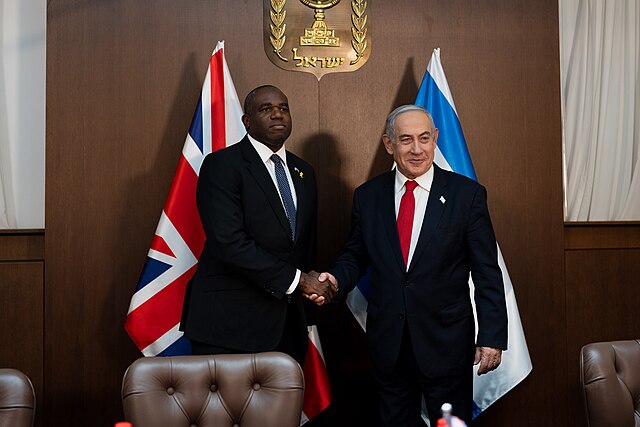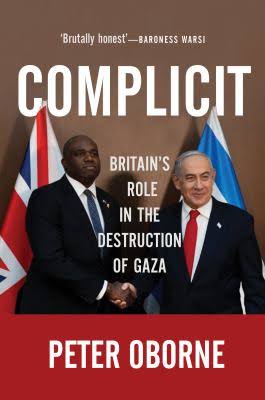
Britain, Oborne points out, is third in the chain of responsibility for the genocide in Gaza, behind Israel itself and ‘its primary patron and collaborator the United states’.
In Complicit, he has written a devastating expose of Britain’s role and of the genocide itself.
Sometimes we feel overwhelmed by the horror of what has happened. Oborne selects detail that encapsulates it. He argues that between 4 and 5% of the population have probably been killed by Israel’s assault: “In Britain, this would translate in to around three million fatalities.” He provides evidence the life expectancy of Gazans fell by 34% in the first 12 months of the assault.
Meanwhile he points out that Israel “killed more journalists in Gaza after October 7, 2023, than were killed in the US Civil War, both World Wars, the Korean War, the Vietnam War…the Yugoslav Wars of the 1990s and the post 2001 Afghanistan War combined”.
Britain has enabled all this in a number of ways. Its military support has been important. Britain has supplied parts for crucial F-35 bombers, essential to their continued use. It has also provided drone support and surveillance flights from the RAF’s Akrotiri base in Cyprus.
But more important Britain has been in lockstep with the US politically, giving Israel and the US crucial political support. Sunak’s Tories were fully on board from the start. Labour’s support has been in some ways more important, ensuring what Oborne calls “a cross party cartel”. Starmer and Lammy have gone beyond the call of duty, starting with Starmer’s statement on LBC that Israel does have the right to cut off power and water to Gaza, an astonishing claim for a human rights lawyer. Starmer followed this a few weeks later with the opinion that a ceasefire was, “not the correct policy”, and has pursued every twist and turn of US policy since. David Lammy’s wooden inhumanity was summed up in the extraordinary throwaway line “there are no journalists in Gaza”.
The rest of the British establishment, including of course the media, has gone along for the ride resulting in what Oborne calls “a multilayered deception”. This, it is important to stress, has not been accidental. The media has systematically ignored the fact that killing civilians is openly Israeli policy, they have refused to recognise the fact that two of the greatest living Jewish historians of Israel, Avi Schlaim and Ilan Pappe, both live in Britain, oppose the genocide and are available for interview. But most important the media has systematically played down the suffering of the Palestinian people and foregrounded that of the Israelis.
Oborne excels in taking apart the various arguments and excuses used by the establishment to conceal or justify its complicity. He dismantles arguments about balance and the ‘we get criticism from both sides’ defence. As he says, this claim ignores the fact that there is a “powerful and well funded lobby in the US and Europe” that exists to exert pressure from the Israeli side and that the Palestinians have nothing like the resources of their Israeli counterparts.
What is more, “This defence…wrongly implies that balance is achieved by picking a spot half way between two positions. Journalism should be guided by the facts.”
One of the many useful things about this book is Oborne’s analysis of what drives the British establishment’s support for genocide. He documents in detail the intimidation and bribery carried out by the Israel lobby. He reminds us for example of the claims by a member of Israeli intelligence working out of the London embassy of plots to take down British politicians hostile to Israel, and of the one million pounds apparently offered by Israel to Labour Friends of Israel.
He also makes the crucial point that the British establishment is so susceptible to pressure because it supports Israel anyway as part of its commitment to the ‘special relationship’ with the US. As he says of Starmer, “first and foremost he was aligning himself with the conventional understanding of British geopolitical interests. This usually meant tucking in behind the US, playing the role of junior partner and closely following Washington’s lead for when to change position.” On this understanding, it is Britain’s imperial interests that determine its support for Israel much more than the Israel lobby.
As Oborne points out there is another driver to Starmer’s contemptible enthusiasm for Israel, and that is the role he has played in attacking the left in the Labour Party.
“Starmer and his advisors had crudely exploited the issue of antisemitism in the Labour Party to aid their factional battle against the left. Expressing reverential support for Israel, in contrast to the pro-Palestine left, thereby became an integral part of their political project.”
My only major quibble is Oborne’s implication that Margaret Thatcher was someone who genuinely respected international norms and the rule of law. This is something of a stretch given her role in the Falklands War, her unequivocal support for George Bush’s illegal invasion of Panama in 1989 and her support for apartheid South Africa amongst other things.
Unusually for a journalist, let alone one with an establishment background, Oborne pays tribute to the opinions of ordinary people expressed in the mass movement for Palestine, and rightly sees the struggle over Palestine in Britain as being one between the people and the elites:
“Hundreds of thousands of ordinary people turned out week after week for months on end to demonstrate, occupy and take action against British complicity. These heroic efforts vindicated the basic decency of the British public. But government policy barely changed.”
Even more unusually, the book ends with something of a call to arms:
“Preventing future outrages by our leaders calls for something more than legal accountability. It requires bringing democracy to Britain’s state and society, whose governing institutions are now indelibly disgraced.”
Who could disagree?
